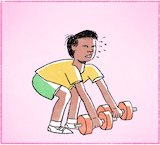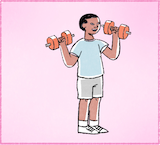

เขากำลังเฮ็ดหญัง กะมีพุซายพุหนึ่งเนาะ กำลังออกกำลังกาย
เบิ่งซงแล้วคือสิเป็นตาเมี่ยย หลือว่าบ่มีแฮง หลือว่าเป็นคนบ่แข็งแลงปานใดที่สิมาออกกำลังกายเนาะ
เขาอาดสิบ่เคยออกกำลังกายจักเที่ย หลืออาดสิเป็นเที่ยแลกของเขาที่มาออกกำลังกาย กะเลยเฮ็ดให้ต้องใซ้แฮงหลาย หลือว่าบ่มีพะละกำลังที่สิญกเคี่ยงออกกำลังกายนี้
แล้วเขาญกอี่หยังตอนนี้ กะบ่แน่ใจคือกัน เขาอาดสิเอิ้นว่าแนวญกเนาะ แนวญก ขั้นสำหลับคนอี่สานเขาเอิ้นว่าแนวญกออกกำลังกายเนาะ
กะญกบ่ขึ้น ญกบ่ขึ้นญกบ่ไหวเนาะ กะเลยเฮ็ดให้เขาเฮ็ดสีหน้าที่สิใซ้พะลังหลายๆ เนาะ
17
เขากำลังเฮ็ดหญัง กะมีพุซายพุหนึ่งเนาะ กำลังยืนออกกำลังกายอยู่
ใซ้มือสองข้างญกแนวญกพุ้นแหล้ว ญกบึ่ดๆๆๆๆ ขึ้นเนาะ
เบิ่งซงแล้วเขาอาดสิมีแฮงคัก หลือว่าอาดสิเป็นคนมีพะละกำลังหลาย หลือว่าแข็งแลงเติบเนาะ จั่งญกได้แบบนี้ ญกขึ้นญกลงได้สะบายพุ้นหนะ
ญกขึ้นสูงซ้ำแมะ คือสิมีแฮงคักเนาะ
Link to overview page
Link to dictionary
| Isaan | Pronunciation | Tones | Thai | English/Notes |
|---|---|---|---|---|
| เขา | khao | M | เขา | personal pronoun: he, she |
| กำลัง | gam-laŋ | M-HR | กำลัง | auxiliary indicating continuous or progressive action |
| เฮ็ด | het | H | ทำ | to do, to make |
| หญัง | ɲaŋ | M | อะไร, เป็นหญัง = ทำไม | 1. what {เขากำลังเฮ็ดหญัง = What is he doing?} {ธูปเอาไว้เฮ็ดหญัง = What are incense sticks for?} 2. something, anything, (nothing) 3. เป็นหญัง[...]คือ in initial position: why {เป็นหญังเขาคือใส่บักพิกลงไปในกวยเตียว = Why is he putting chili in [his] noodle soup?} {เป็นหญังหน้าต่างมันคือเปิด = Why is the window open?} {เป็นหญังมันคือมีควนไฟ = Why is there smoke?} |
| กะ | ga | M | ก็ | 1. then, consequently 2. also |
| มี | mi: | HR | มี | 1. to have 2. there is |
| พุซาย | phu-sa:i | H-HR | ผู้ชาย | man, male |
| พุ | phu | H | ผู้ | 1. person 2. clf. for people {พุหญิงพุหนึ่ง พุซายพุหนึ่ง = a woman, a man} {ซู่พุซู่คน = everybody} {พุหนึ่งโตจ่อยๆ พุหนึ่งโตบักอ้วนหนึ่ง = one person is slim, the other is fat} Notes: pronunciation: also realized as พู่- |
| หนึ่ง | nʉŋ | H | หนึ่ง | 1. one 2. after adjective: intensifier {บักคักหนึ่ง = very much} {อันบักใหญ่หนึ่ง = very large}, or attenuates the meaning {กะดาดมันแผ่นน้อยๆ หนึ่ง = the piece of paper is [relatively] small} |
| เนาะ | nɔ | H | เนาะ | final particle: makes the statement softer, looking for agreement |
| ออกกำลังกาย | ɔ:k-gam-laŋ-ga:i | LF-M-HR-M | ออกกำลังกาย | to exercise |
| เบิ่ง | bəŋ | H | ดู | 1. to look at, to see, to watch {เบิ่งโทละทัด = to watch TV} {เบิ่งหนัง = to watch a movie} 2. to guess {เบิ่งซงแล้ว ... = [I] guess / from what it looks like ...} |
| ซง | soŋ | HR | ทรง | 1. shape, form 2. as if, like Notes: translation to be confirmed |
| แล้ว | lɛ:o | HF | แล้ว | 1. finished 2. already 3. and then, and next (especially แล้วกะ) 4. auxiliary for past tense |
| คือ | khʉ: | HR | คือ | 1. to be, to resemble, like, as 2. why {บักหล้าคือบ่เก็บโต่ะแน่ = [addressing a young boy] Why haven't you cleared the table?} |
| สิ | si | M | จะ | future tense auxiliary {เขากำลังสิตื่น = he's about to wake up} {สิไปตะหลาด = [I'm] going to the market} |
| เป็น | pen | M | เป็น | 1. to be, to exist 2. to be able to 3. to suffer, sth. happens to 4. เป็นหญัง[...]คือ in initial position: why? {เป็นหญังเขากะคือแปงฟัน = Why is he brushing his teeth?} {เป็นหญังเคี่ยงบินมันคือสิตก = Why is the airplane falling down?} |
| ตา | ta: | M | ตา | as a prefix: likely, worthy, fit for (like Thai น่า-) {ตาฮัก = lovely/cute} {ตาสะออน = praiseworthy} {ตาหวาน = (of ice cream) [likely to be] sweet} {ตาอยู่ = to be a good place to be} Notes: see also various entries for ตา-, e.g., ตาแซบ, ตาพู่ฮ้าย, ตาย้าน, ตาอยากหัว, ตาฮัก, ตามีแฮง |
| เมี่ยย | mi:ai | H | เมื่อย | 1. to be exhausted, tired 2. to feel stiff |
| หลือ | lʉ: | M | หรือ | or |
| ว่า | wa: | H | ว่า | 1. that, as {คำว่า X = the word X} 2. to say |
| บ่ | bɔ: | H | ไม่ | 1. no, not 2. question particle, transforming a statement into a question Notes: spelling exception in line with common usage on social media |
| แฮง | hɛ:ŋ | HR | แรง | 1. strong {ลมกำลังพัดแฮงอยู่ = to wind is blowing strongly} 2. loud {เสียงแฮง = loud} 3. strength, power |
| คน | khon | HR | คน | person, people |
| แข็งแลง | khɛŋ-lɛ:ŋ | M-HR | แข็งแรง | strong, healthy, robust |
| ปานใด | pa:n-dai | M-M | เท่าไหร่, มาก | 1. after negative: (not) very, (not) so much {บ่ใหญ่ปานใด = not so large, not very large} 2. how much, how many {เฮาบ่สามาดนับได้ว่ามันมีหลายปานใด = it's impossible to count how many there are} |
| ที่ | thi: | H | ที่ | 1. that, which {คนที่ยืนอยู่ฝั่งขวา = the person which is standing on the right = the person standing on the right} {เว้าคำที่บ่สุพาบ = to speak words which are impolite = to speak impolitely} 2. for ordinal numbers {ที่สาม = third} |
| มา | ma: | HR | มา | 1. to come 2. auxiliary expressing action towards the present or focal time {กะคุเฮ็ดมาจากอี่หยัง = What is the bucket made of?} {แล้วเขากะเก็บเงินจากพุนั้นมา = and then she takes the money of that person} |
| อาด | a:t | LF | อาจ | 1. might, may, will 2. likely |
| เคย | khə:i | HR | เคย | once, ever |
| จัก | jak | M | จัก | 1. answer to a question: [I] don't know, don't know exactly, [I'm] not sure {พุซายคนนี้เขาเถ้าไป่ จัก จักเถ้าหลือบ่เถ้า เบิ่งบ่ค่อยออก = Is this man here already old? I don't know. I can't see clearly whether he's old or not.} {เขาเว้ากันอยู่ใส จักคือกัน = Where are they talking? I don't know either.} 2. exact(ly), what exactly {จักต้มอี่หยังกะบ่ฮู้ = I don't know what (exactly) he is cooking} {บ่ลู้คือกันจักปาอี่หยัง = I don't know either what kind of fish this is} 3. how much/many? {ต้นไม้มีจักต้น = How many trees are there?} {ตอนนี้จักโมงแล้ว = What time is it now?} {มือของเฮานี้สิมีจักนิ้ว = How many fingers do our hands have?} 4. a bit, a little bit {จักหน่อย/จักหน่อยหนึ่ง = a bit, a little bit} |
| เที่ย | thi:a | H | ครั้ง, เที่ยว | clf. for times, rounds {บางเที่ย = sometimes} |
| แลก | lɛ:k | HF | แรก | first {ตอนแลก = at first} {พุซายคนแลก = the first man} {มื้อแลก = the first day} |
| ของ | khɔ:ŋ | M | ของ | of, belonging to |
| เลย | lə:i | HR | เลย | 1. futher on, beyond, past {เข็มน้อยเลยเลขสิบสองไป = the minute hand has passed number twelve} 2. too much 3. at all 4. definitively 5. completely, utterly |
| ให้ | hai | LF | ให้ | 1. to give {หมอกำลังเอายาให้คนป่วยกิน = the doctor is giving the patient medicine} 2. for 3. to allow, to be allowed |
| ต้อง | tɔŋ | HF | ต้อง | to have to, must |
| ใซ้ | sai | HF | ใช้ | to use |
| หลาย | la:i | M | เยอะ, มาก | many, much, very |
| พะละกำลัง | pha-la-gam-laŋ | H-H-M-HR | พละกำลัง | strength |
| ญก | ɲok | H | ยก | 1. to raise {ญกมือขึ้น = to raise the hand} {ญกโตอย่าง = to give an example} 2. to lift {เขากำลังญกก้อนหินขึ้น = he's lifting up the stone} |
| เคี่ยง | khi:aŋ | H | เครื่อง | 1. machine, engine 2. clf. for machines, airplanes, electronic devices etc. Notes: pronunciation: also realized as เคื่อง |
| นี้ | ni: | HF | นี้ | 1. this 2. here |
| อี่หยัง | i:-yaŋ | H-M | อะไร | 1. what {นี้คืออี่หยัง = What is this?} {มื้อนี้เจ้าเฮ็ดอี่หยัง = What are you doing today?} {กินเข้างายกับอี่หยัง = What did you have for breakfast?} 2. something, anything, (in negations) nothing {บ่ต้องเฮ็ดอี่หยังอีกเลยนอกจากใส่ปุย = [we] don't need to do anything besides adding fertilizer} |
| ตอนนี้ | tɔ:n-ni: | M-HF | ตอนนี้ | now |
| แน่ใจ | nɛ:-jai | H-M | แน่ใจ | to be sure, confident, certain |
| คือกัน | khʉ:-gan | HR-M | เหมือนกัน | 1. also, likewise, similarly {ยินดีที่ได้ฮู้จักคือกันคับ = Nice to meet you too!} 2. in negative sentences: either {บ่ลู้คือกัน = I don't know either} {จักคือกัน = I don't know (either)} |
| เอิ้น | ə:n | HF | พูด, เรียก | to call, to say {เอิ้นง่ายๆ ว่า = in other words} {คนอี่สานเอิ้นว่า เป็นลูกคนกก = Isaan people call her ลูกคนกก} |
| แนวญก | nɛ:o-ɲok | HR-H | น้ำหนัก | weight (as in weightlifting) {ญกแนวญก = weightlifting, to lift weights} |
| ขั้น | khan | LF | เมื่อ | when, if |
| สำหลับ | sam-lap | M-M | สำหรับ | for |
| อี่สาน | i:-sa:n | H-M | อีสาน | Isaan {คนอี่สาน = Isaan person} |
| ขึ้น | khʉn | LF | ขึ้น | 1. to go up, to increase 2. sun: to rise {ตะเว็นกำลังขึ้น = the sun is rising} 3. more 4. bus/train etc.: to get on, to board {พุโดยสานขึ้นลดไฟเบิดแล้ว = all passengers have boarded the train} |
| ไหว | wai | M | ไหว | to be able to, to be capable of |
| สีหน้า | si:-na: | M-LF | สีหน้า | face, facial expression |
| พะลัง | pha-laŋ | H-HR | พลัง | energy, power, strength |
| ยืน | yʉ:n | M | ยืน | to stand |
| อยู่ | yu: | H | อยู่ | 1. to be (located) at 2. yet, still 3. auxiliary indicating continuous or progressive action {ทอดปาอยู่ในกะทะ = (in the process of) frying a fish in the pan} {แม่กำลังเมี้ยนเฮียนอยู่ = mother is cleaning/tidying up the house} |
| มือ | mʉ: | HR | มือ | 1. hand 2. front leg/paw (e.g., of a cat) |
| สอง | sɔ:ŋ | M | สอง | two |
| ข้าง | kha:ŋ | LF | ข้าง | 1. side {มีหูจับสองข้าง = there are handles on both sides} 2. next to {วางอยู่ข้างๆ ก่องใบใหญ่ = it's placed next to the large box} {เขายืนอยู่ข้างๆ อีกพุหนึ่ง = he's standing next to another person} 3. clf. for body parts which come in pairs (eyes, ears, legs etc.) {เขามีตาสองข้าง = she has two eyes} |
| พุ้นแหล้ว | phun-lɛ:o | HF-LF | นู่นแหละ | auxiliary for emphasis at the end of a phrase Notes: variant of พุ้นหละ |
| บึ่ด | bʉt | H | refers to the sound of lifting something Notes: translation uncertain |
|
| คัก | khak | H | intensifier: very, very much | |
| เติบ | tə:p | LF | intensifier: very, much {เว้ากันโดนเติบ = to talk a long time} | |
| จั่ง | jaŋ | H | ค่อย (?) | then, afterwards {ต้องใซ้น้ำมันพ้อม มันจั่งสิทอดได้ = one needs to use oil as well, then one can fry [food]} |
| ได้ | dai | HF | ได้ | 1. can 2. to get, to obtain 3. before verb: indicating past tense 4. บ่ได้ + verb: not |
| แบบ | bɛ:p | LF | แบบ | 1. example, model, kind 2. style, form, pattern, design |
| ลง | loŋ | HR | ลง | 1. to descend, to lower, to go down 2. down 3. bus/train etc.: to get off, to disembark {คนกำลังลงลดบั่ด = people are getting off the bus} 4. boat/ship etc.: to get on, to board {เขากำลังญ่างลงเลีย = he's boarding/getting on the boat} |
| สะบาย | sa-ba:i | M-M | สบาย | to be well, to be healthy |
| พุ้นหนะ | phun-na | HF-H | นู่นแหละ | auxiliary for emphasis at the end of a phrase Notes: variant of พุ้นหละ |
| สูง | su:ŋ | M | สูง | high, tall |
| ซ้ำแมะ | sam-mɛ | HF-H | (ด้วย)แหละ | final particle used for emphasis Notes: also pronounced ซ้ำแม |